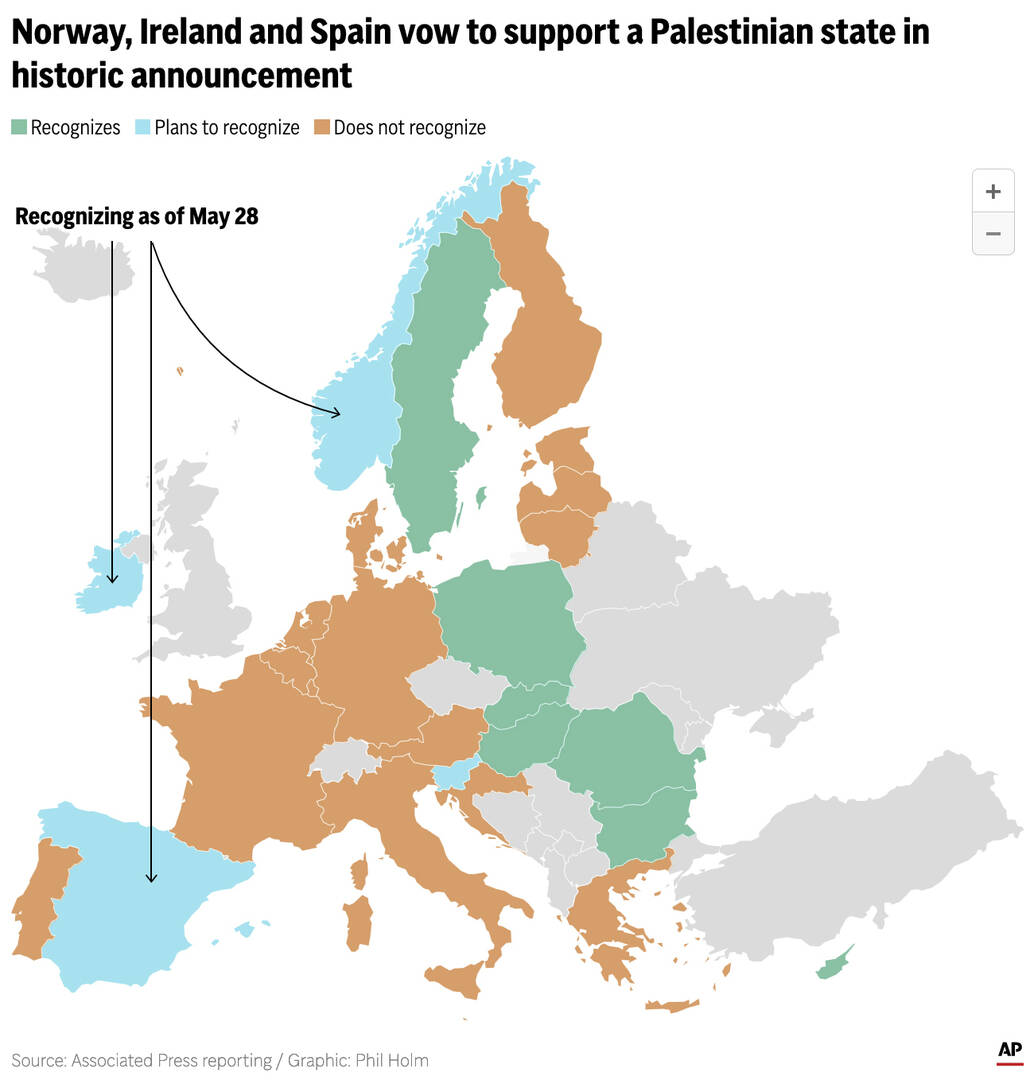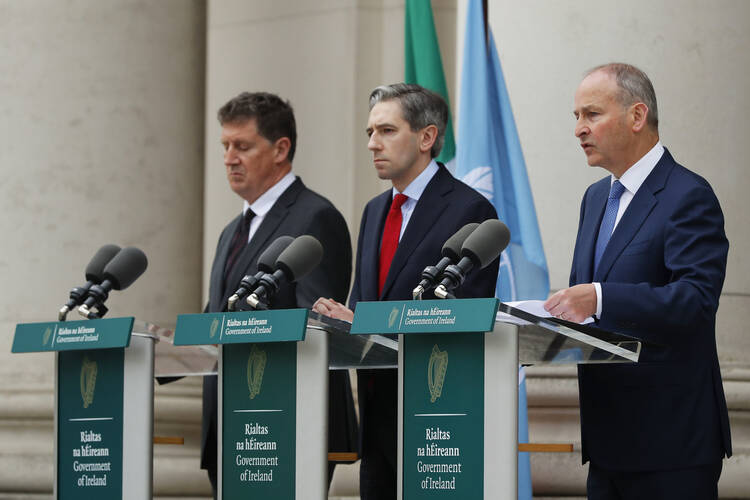Working in unison with the governments of Spain and Norway, the Republic of Ireland announced on May 22 that it formally recognized the legitimacy of the State of Palestine. The Spanish prime minister, Pedro Sanchez, said, “We hope that our recognition and our reasons contribute to other Western countries following this path.”
The Norwegian prime minister, Jonas Gahr Store, said, “Recognition of Palestine is a means of supporting the moderate forces” and is a vital step toward achieving the end goal: “Israelis and Palestinians have a right to live in peace in their respective states.”
While the majority of nations around the world already acknowledge the existence of the State of Palestine, the only Western European nation to do so before this week has been Sweden. There has long been a conversation in Ireland about taking this step, but as Minister for the Environment Eamon Ryan, said after the announcement, “If not now, when?”
The taoiseach (Ireland’s prime minister), Simon Harris, in a speech announcing the decision, focused on the fact that Palestinian people are “enduring the most appalling suffering, hardship and starvation.” He repeatedly cited the harm being caused to children by the Israel Defense Forces campaign against Hamas: “Can anyone justify children going to sleep at night not knowing if they will wake up?” he asked. “Children are innocent,” Mr. Harris said. “The children of Israel. The children of Palestine. They deserve peace.”
The leaders of Norway, Spain and Ireland were unequivocal in their condemnation of the Oct. 7 attack by Hamas on southern Israel. Mr. Harris described it as a “barbaric massacre” and sought to underline that “Hamas is not the Palestinian people.”
The Irish government repeated its call for the release of all hostages, the cessation of rocket attacks on Israel and affirmed the legitimacy of the State of Israel. “Ireland is resolute and unequivocal in fully recognizing the State of Israel and Israel’s right to exist securely and in peace with its neighbors,” Mr. Harris said. But he also demanded an immediate ceasefire, an end to I.D.F. operations in Rafah and unhindered access for humanitarian aid to flood into the region.

Persistent polling results suggest that the cause of Palestinian people resonates strongly with the Irish people. Emmet Sheerin is an Irish documentary filmmaker who has lived in Palestine, working for the World Council of Churches. He attributes the strong Irish support of the people of Palestine to the fact that “we were a colonized people. We understand what colonization means.” Palestinians face a much stronger neighbor who apparently can occupy territory with impunity. Irish people, with a strong cultural memory of British rule, have a visceral reaction to such a situation, he suggests.
As the government has repeatedly made clear, support of Palestinians, even Palestinian statehood, does not mean support of Hamas and its brutal tactics. Rather, it is understood that the only way to move beyond the present tragic impasse is to offer tangible support to the Palestinian people, cultivating their legitimate and natural desire for self-determination and the chance to build a flourishing society. The taoiseach could not have been more clear: “Recognising the statehood of Palestine sends a message that there is a viable alternative to the nihilism of Hamas.”
And just as support of Irish independence did not imply a desire to destroy the United Kingdom, the Irish recognition of Palestine is not a dismissal of Israel. As the tánaiste (deputy leader of the Irish government), Micheál Martin, put it: “Recognition of Palestine is not the end of a process; it is the beginning. It is our conviction that the two-state solution remains the only viable option to secure a just and lasting peace, and a better future.”
The taoiseach explicitly touched on how Irish people see a reflection of their struggle when they look at Palestine. He referenced the moment in Irish history when the revolutionary leaders made a plea to the international community to recognize the nation’s legitimacy, reminding his listeners of the “Message to the Free Nations of the World” issued in 1919. “Today,” he said, “we use the same language to support the recognition of Palestine as a state.”
Perhaps most important, it must be remembered that alongside a struggle against colonialism, the Irish government has been forged in conflict with terrorist forces. In his comments, Mr. Ryan made reference to “Omagh,” the market town in Northern Ireland that was devastated in 1998 by a savage bomb attack conducted by dissident Republican paramilitaries.
Without drawing an equivalence to the horror of Oct. 7 or the countless other incidents of terrorist violence endured by the Israeli people, the Irish people—like the people of Spain and Norway—are not unaware of the harm inflicted by such abominations. But each nation in its own way can also testify that peace is not restored through a military response.
As Irish political leaders have long noted, the still-fragile peace established in Northern Ireland was achieved not through the relentless, smothering efforts of the British military forces or by the success of terror tactics. Peace was built through painstaking and painful compromises patiently and sacrificially battered out over years that culminated in the Good Friday accords. One of the major architects of that peace process, former Irish prime minister Bertie Ahern, explained, “A big part of the job was trying to get people to trust and be confident to negotiate and get a sense of good spirit around the talks.”
Mr. Harris’s concluding point touched on Ireland’s longstanding commitment to the diplomatic resolution of international conflict. “Ireland will always stand with all those ready to walk a political pathway to peace and we will do everything in our power to help to bring it about.” But here a tension may arise. While his government has sought to build momentum around a diplomatic resolution to the ongoing conflict in Gaza, Mr. Harris has also been modifying the terms of Irish neutrality.
It has long been recognized that there is a connection between the effectiveness of the Irish diplomatic corps and the non-aligned, non-offensive nature of the Irish military. The Irish army strictly limits itself to peacekeeping duties. Irish soldiers have been stationed in Lebanon for decades. Their deployment has been guided by a protocol known as the “Triple Lock.” Forces cannot be dispatched unless there is a U.N. resolution and an explicit decision by the government and a vote in support from the parliament.
Under proposals coming before the Irish Parliament, the requirement to have a U.N. resolution will be removed, meaning Irish troops could be dispatched without an international consensus. The taoiseach insists that this is a wise adaptation for the contemporary geopolitical context Ireland confronts. Mr. Martin, defending the proposed change, has explained that because Russia has a permanent seat on the U.N. Security Council, under the current arrangement Ireland might be blocked from supporting a close ally like Ukraine if it cannot deploy its troops without a U.N. resolution.
Mr. Sheerin believes this is a miscalculation. His most recent film, “Who Would Jesus Bomb?,” tells the story of Catholic peace activists who have consistently sought to disrupt the use of Shannon airport, in the west of Ireland, by the U.S. military. Since the start of the U.S.-declared war on terror, at least three million journeys have been made by American soldiers through this civilian facility. While both Irish and U.S. officials frequently describe these flights as mundane transports of troops and supplies, in over 20 years, independent inspections to determine whether military missions have been conducted through Shannon have not been carried out.
By turning a blind eye to the use of Shannon as a cog in the U.S. military machine, Mr. Sheerin argues that Ireland is evading its own complicity “in the destruction and the destabilization of the Middle East.” Ireland is caught between its sincere support of the Palestinian people and its close and treasured connections with the United States, an awkward diplomatic spot that tends to silence criticism of the actual mechanics of the conflict in Palestine.
Ireland needs to go beyond “talking a good game” about peace in Israel-Palestine, Mr. Sheerin says, to “pushing for much more practical action.” One action it could take would be the implementation of the Occupied Territories Bill, a proposed law that would not boycott Israeli products but would block the sale of goods from illegal settlements on the West Bank and require “at a minimum, searching the planes at Shannon.”
Meanwhile, the diplomatic costs of the statehood recognition are already being felt in Dublin. The Israeli ambassador has been recalled, and the Biden administration is reportedly unhappy with the decision. Depending on how much anger there is, there may be economic consequences for Ireland, which has benefited greatly from investments from U.S. firms. But Mr. Harris has the strong support of the electorate, and, he says, the Irish government is convinced that recognizing Palestinian statehood is simply “the right thing to do.” Spain, Norway and Ireland hope their collective gesture may rejuvenate a long-stalled peace process.
Maintaining an independent voice—distinct from more powerful allies and alliances—will be a challenge Ireland must face. From that perspective, it is clear that preserving a robust military neutrality may be central to its credibility as a diplomatic actor.








